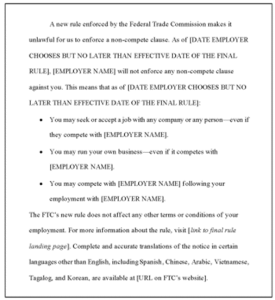New FTC Noncompete Rule May Change the Employment Landscape
By: Patrick S. McCarney
After more than a year of deliberation about a rule first proposed in January 2023 and after consideration of more than 26,000 comments from members of the public, the Federal Trade Commission (“FTC”) voted 3 – 2 to adopt a final rule banning the enforceability of almost all noncompete agreements in all employment contexts—a rule that will affect the employers of more than 30 million American workers. According to the FTC, more than 96% of the public comments it received supported a federal ban of noncompete agreements.
However, critics have accused the FTC of exceeding its statutory authority and twisting the language of the FTC Act. In a press release, Suzanne Clark, President and CEO of the U.S. Chamber of Commerce, called the FTC’s rule “not only unlawful, but also a blatant power grab that will undermine American businesses’ ability to remain competitive.” She further stated that “The Chamber will sue the FTC to block this unnecessary and unlawful rule. . .” In fact, several lawsuits seeking to prevent the rule from becoming enforceable have already been filed, and businesses should expect that this rule will be the subject of additional, swift legal challenges brought by employers and various trade associations. It is therefore possible that this rule, as written, never becomes law. However, in the event legal challenges fail and the new rule officially takes effect, it will be a significant change to the U.S. economy and labor market.
In the final rule, the FTC formally concluded that noncompete agreements are an unfair restraint on trade that violates Section 5 of the FTC Act of 1914. The rule bans employers from entering any new noncompete agreements with any workers, including senior executives, after the effective date of the rule (120 days after the rule is formally published in the Federal Register, which has not yet occurred). The rule extends beyond employees to all natural persons serving as independent contractors, externs, interns, volunteers, apprentices, or sole proprietors providing a service to a person. Additionally, the rule extends to both formal contractual provisions and less formal workplace policies — whether written or oral.
While the rule bans the creation of new noncompete agreements, the FTC adopted a bifurcated approach with respect to existing agreements. Existing noncompete agreements will not be enforceable after the effective date for most workers, but senior executives — those earning more than $151,164.00 per year who are in a “policy-making position” — can still be bound to existing noncompete agreements entered before the effective date, although no new noncompete agreements with senior executives will be allowed. The FTC estimates that senior executives who fall into this definition comprise less than 0.75 percent of workers in the United States.
Exclusivity and conflict-of-interest policies preventing a worker from working for a competitor during their employment/contractual term are not banned. The new rule also does not affect the enforceability of noncompete agreements that arise from the bona fide sale of a business entity, a person’s ownership interest in a business entity, or all (or substantially all) of a business entity’s operating assets. Further, the rule does not retroactively destroy causes of action related to an existing noncompete agreement if they accrue prior to the effective date. Additionally, other common restrictive employment provisions, such as nonsolicitation agreements and nondisclosure agreements are not affected by the rule, provided that such agreements do not “prohibit” or “penalize” a worker from seeking or accepting work from another or operating a business after the conclusion of employment. Therefore, many of the most critical reasons for having restrictive covenants with workers, such as the protection of trade secrets, will remain protected.
While noncompete agreements remain enforceable through the effective date, employers are required to notify any worker presently bound by a noncompete agreement (other than senior executives) that the noncompete provision will not be enforced against them in the future. The notice must be provided no later than the effective date and can be provided by hand delivery, mail, email, or text message. To assist businesses with compliance, the FTC has provided model notice language in the final rule:

We will continue to monitor this rule and any legal action related thereto and provide further updates of any breaking developments. In the interim, for more information on this rule or its potential impact on your business, please contact the corporate law and employment law attorneys of Riley Bennett Egloff LLP.
This information is provided as an informational service of Riley Bennett Egloff. It does not constitute legal advice and does not create any attorney-client relationship with any reader with whom an attorney-client relationship has not already been established.

Patrick S. McCarney
In addition to his robust litigation practice, Patrick also assists businesses, business owners, and financial institutions with loan transactions, real property transactions, mergers and acquisitions, general contractual matters, and general governance matters. Patrick has assisted his clients with transactions both big and small—from five figures to nine figures. Beyond his work for business and other commercial entities, Patrick has also assisted Indiana political subdivisions with a variety of municipal law issues, including by drafting legal opinions for elected officials and drafting ordinances.
© Riley Bennett Egloff LLP®
Disclaimer: Article is made available for educational purposes only and is not intended as legal advice. If you have questions about any matters in this article, please get in touch with the author directly.
Permissions: You are permitted to reproduce this material in any format, provided that you do not alter the content in any way and do not charge a fee beyond the cost of reproduction. Please include the following statement on any distributed copy: “By Patrick S. McCarney © Riley Bennett Egloff LLP – Indianapolis, Indiana. www.rbelaw.com”
Posted April 25, 2024, by Patrick S. McCarney
